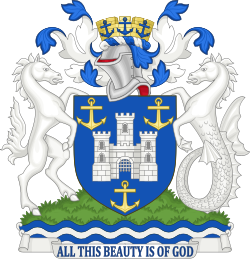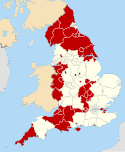Isle of Wight Council
Isle of Wight Council | |
|---|---|
 | |
 | |
| Type | |
| Type | |
| History | |
| Founded | 1 April 1890 (Isle of Wight County Council) 1 April 1995 (Isle of Wight Council) |
| Leadership | |
Wendy Perera since April 2022[3] | |
| Structure | |
| Seats | 39 councillors |
Political groups |
|
| Elections | |
| First past the post | |
Last election | 6 May 2021 |
Next election | 1 May 2025 |
| Meeting place | |
 | |
| County Hall, High Street, Newport, PO30 1UD | |
| Website | |
| www | |
Isle of Wight Council, known between 1890 and 1995 as Isle of Wight County Council, is the local authority for the Isle of Wight in England. Since 1995 it has been a unitary authority, being a county council which also performs the functions of a district council. It is based at County Hall in Newport. The council has been under no overall control since 2021, being led by a coalition of independent, Green, and Our Island councillors called the Alliance Group.
History
[edit]
Elected county councils were established in England and Wales in 1889 under the Local Government Act 1888, taking over administrative functions previously carried out by unelected magistrates at the quarter sessions.[4] As part of the historic county of Hampshire, the Isle of Wight was initially governed by Hampshire County Council. Shortly afterwards it was decided that the island should form its own administrative county, whilst remaining part of Hampshire for judicial and lieutenancy purposes.[5]

The Isle of Wight County Council was therefore established with effect from 1 April 1890, on which day the council held its first official meeting at the Guildhall in Newport. Somerset Gough-Calthorpe was appointed the first chairman of the council.[6]
Until 1974 the lower tier of local government comprised several boroughs, urban districts and a rural district. In 1974, under the Local Government Act 1972, the lower tier was reorganised and the island was left with two districts: Medina and South Wight.[7][8] As part of the same reforms the island was reclassified as a non-metropolitan county and given its own Lord Lieutenant and High Sheriff, finally making it separate from Hampshire for ceremonial as well as administrative purposes.[9]

On 1 April 1995, following recommendations made by the Local Government Commission for England appointed in 1992, the two district councils were abolished and the county council assumed their functions, making it a unitary authority. It was renamed 'Isle of Wight Council' at the same time. It remains legally a county council, but one which also performs district functions. It was the first such unitary authority in England; many more were created from 1996 onwards.[10]
The council has been a member of the Islands Forum since 2022.
Governance
[edit]The council performs both district-level and county-level functions. The whole island is also covered by civil parishes, which form a second tier of local government.[11]
Political control
[edit]The council has been under no overall control since the 2021 election, being led by a minority coalition called the Alliance Group, comprising some of the independent councillors, the Green Party and local party Our Island.[12]
Political control of the council since the 1974 reforms has been as follows:[13]
Upper-tier authority: Isle of Wight County Council
| Party in control | Years | |
|---|---|---|
| Independent | 1974–1977 | |
| Conservative | 1977–1981 | |
| Liberal | 1981–1985 | |
| Alliance | 1985–1988 | |
| Liberal Democrats | 1988–1995 | |
Unitary authority: Isle of Wight Council
| Party in control | Years | |
|---|---|---|
| Liberal Democrats | 1995–1998 | |
| No overall control | 1998–2005 | |
| Conservative | 2005–2013 | |
| No overall control | 2013–2017 | |
| Conservative | 2017–2021 | |
| No overall control | 2021–present | |
Leadership
[edit]The leaders of the council since 2007 have been:[14]
| Councillor | Party | From | To | |
|---|---|---|---|---|
| Andy Sutton | Conservative | Sep 2007 | ||
| David Pugh | Conservative | Sep 2007 | 5 May 2013 | |
| Ian Stephens | Independent | 15 May 2013 | 21 Jan 2015 | |
| Jonathan Bacon[15] | Independent | 21 Jan 2015 | 16 Jan 2017 | |
| Dave Stewart | Conservative | 18 Jan 2017 | 9 May 2021 | |
| Lora Peacey-Wilcox | Independent | 26 May 2021 | 20 Sep 2023 | |
| Phil Jordan | Independent | 20 Sep 2023 | ||
Composition
[edit]Following the 2021 election and subsequent by-elections and changes of allegiance up to May 2024, the composition of the council was as follows:[16]
| Party | Councillors | |
|---|---|---|
| Conservative | 16 | |
| Independent | 15 | |
| Liberal Democrats | 4 | |
| Green | 2 | |
| Labour | 1 | |
| Our Island | 1 | |
| Total | 39 | |
Of the independent councillors, ten (two of whom belong to the Island Independent Network, part of the Independent Network, a national umbrella group supporting independent councillors) sit in the "Alliance Group" with the Green Party and Our Island councillors, which forms the council's administration. Of the other five independent councillors, three sit together as the "Empowering Islanders" group and the other two (one of whom describes themselves as "Independent Labour") do not form part of a group.[17] The next election is due in 2025.
Premises
[edit]
The council meets and has its main offices at County Hall on High Street in Newport.[18]
The council initially met at the Guildhall in Newport. In 1904 it moved its meeting place to the Technical Institute (now the Island Sixth Form) at the southern end of St James Street in Newport. Until the 1930s the council's administrative offices were split between several different buildings.[19]
By the 1930s, many of the council's offices were at the former Swan Hotel and adjacent houses in High Street, Newport.[20] A new building, designed in the Neo-Georgian style by Gutteridge and Gutteridge, was built on the same site and opened in October 1938. An extension was built on its east side in 1969.[21]
Elections
[edit]Since the last boundary changes in 2021 the island has been divided into 39 electoral divisions, each of which elects one councillors. Elections are held every four years.[22]
Coat of arms
[edit]The coat of arms of the Isle of Wight was granted to the County Council in 1938. The shield shows a representation of Carisbrooke Castle, which was the historic seat of many island governors, surrounded by three gold anchors. At the bottom is the island's motto "All this beauty is of God".
See also
[edit]References
[edit]- ^ Dyer, Oliver (15 May 2024). "Isle of Wight Council elects new chair and vice chair". Isle of Wight County Press. Retrieved 6 July 2024.
- ^ Morgan, Lucy (20 September 2023). "Isle of Wight Council has a new leader at County Hall". Isle of Wight County Press. Retrieved 23 September 2023.
- ^ "New chief executive appointed". Isle of Wight Council. Retrieved 23 September 2023.
- ^ John Edwards, "County" in Chambers's Encyclopedia (London: George Newnes, 1955), pp.189–191
- ^ "Local Government Board's Provisional Order Confirmation (No. 2) Act 1889". legislation.gov.uk. The National Archives. Retrieved 17 March 2024.
- ^ "Isle of Wight County Council". Isle of Wight County Press. Newport. 5 April 1890. p. 2. Retrieved 12 May 2024.
- ^ "The English Non-metropolitan Districts (Definition) Order 1972", legislation.gov.uk, The National Archives, SI 1972/2039, retrieved 12 May 2024
- ^ "The English Non-metropolitan Districts (Names) Order 1973", legislation.gov.uk, The National Archives, SI 1973/551, retrieved 12 May 2024
- ^ "Local Government Act 1972", legislation.gov.uk, The National Archives, 1972 c. 70, retrieved 12 May 2024
- ^ "The Isle of Wight (Structural Change) Order 1994", legislation.gov.uk, The National Archives, SI 1994/1210, retrieved 12 May 2024
- ^ "Election Maps". Ordnance Survey. Retrieved 12 May 2024.
- ^ Morgan, Lucy (26 May 2021). "Council Conservative boss Steve Hastings promises 'robust' opposition". County Press. Retrieved 12 May 2024.
- ^ "Compositions calculator". The Elections Centre. Retrieved 3 March 2023.
- ^ "Council minutes". Isle of Wight Council. Retrieved 22 July 2022.
- ^ Toogood, Darren (16 January 2017). "Council leader and deputy step down with immediate effect". Island Echo. Retrieved 22 July 2022.
- ^ "Isle of Wight". Local Councils. Retrieved 12 May 2024.
- ^ "Your councillors by party". Isle of Wight Council. Retrieved 12 May 2024.
- ^ "Councillors". Isle of Wight Council. Retrieved 12 May 2024.
- ^ Kelly's Directory of Hampshire and the Isle of Wight. 1911. pp. 683–684. Retrieved 12 May 2024.
- ^ County Hall history at wightpedia.org.uk, accessed 2 May 2020
- ^ David Wharton Lloyd, Nikolaus Pevsner The Isle of Wight (Yale University Press, 2006, ISBN 978-0300107333), pp. 177-178
- ^ "The Isle of Wight (Electoral Changes) Order 2020", legislation.gov.uk, The National Archives, SI 2020/64, retrieved 12 May 2024

